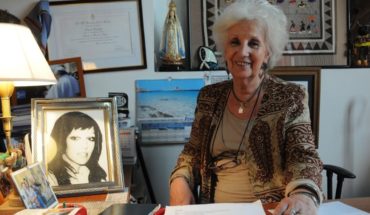
“As most of you know, I was the first in DW to be infected by the new coronavirus. Since then, I have fully recovered and worked both from the bonn and berlin headquarters and from home.”
Thus begins his letter Peter Limbourg, managing director of Deutsche Welle (DW), the international broadcaster of Germany, who a few weeks ago wrote to all the employees of the chain to tell them that he had tested positive for the new coronavirus.
On Sunday, he turned to German public broadcasters again to tell his experience and explain what helped him cope the most.
“It was a surprise that COVID-19 caught up with me so soon, especially for me,” she explains. Since February, the company had taken preventive measures to protect all employees. “I hadn’t shaken anyone’s hand since the end of February, I had given up hugs and always washed my hands well,” she says. “But it didn’t do much good, because I probably got infected at a dinner party in Berlin.”
One of the guests, who sat next to Limbourg and with whom the director spoke for a few minutes, tested positive days after the meeting. “It was clear that he could have been infected,” he says.
“Since then, I’ve stayed home. First I informed my closest colleagues, then my GP, with whom I remembered to wait to take the test. He told me that doing a test as soon as it could be wrong.” Then came the symptoms: cough, moderate fever, tiredness, slight dizziness, pain in the extremities and “a form of headache unknown to me until then,” Limbourg recalls.
“Overall, it wasn’t nice, but it was bearable,” he sums up. “One day after the test I had the result: positive! I decided to interrupt my Lent fast and drink a good wheat beer,” he says. Although he admits that “that helped,” he explains that it is not advisable to consume alcohol when suffering from the disease because the body needs a lot of hydration.
And he admits that he would have been disappointed if he had been negative: “If you suffer all the symptoms, unless it wasn’t in vain, I thought.”
Limbourg informed the health authorities in Berlin-Charlottenburg, who responded efficiently, and also reviewed the list of people he had had contact with. “I was lucky enough to have my wife and eldest son with me during this time. Together, such a situation is always easier to carry. The time of illness and quarantine has brought us even closer,” he says, “but, of course, this situation also leads to concern for the family, you don’t want to infect anyone.” He tried, but his wife and son also tested positive a few days later. “Thank God you’re both fine again.”
Don’t underestimate the disease
“Coronavirus is different from a normal flu. It arrives quickly and you feel bad immediately, after a few days it improves and it ends,” warns the CEO. “The progress of the virus, however, is not linear evolution, but by waves,” he explains. He also says he felt an improvement at four days, but at six he had new symptoms, including gastrointestinal discomfort, slight punctures in the lungs and partial loss of senses. “Suddenly, I couldn’t taste or smell, although the difference between sweet and salty was still noticeable,” she says, “honey and ketchup tasted the same.” This happened in the middle of the disease and lasted four or five days.
“During the illness I was not always full of optimism. In the end, you don’t really know what to expect. I felt like I was on an unknown path with an uncertain fate. It’s good to know that 80% of those affected have mild symptoms, but you can’t know for sure if you were infected with the toughest variant,” he says.
“And when I read the information about the worst-case scenarios, I see that this disease should not be underestimated,” he concludes.





